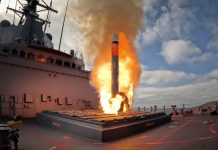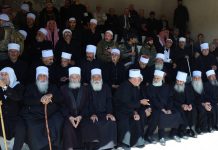By Kashish Tandon
The Turkish Bayraktar drone had hogged the limelight after it offered Azerbaijan a crucial advantage over Armenia during the six-week war over Nagorno-Karabakh last year. Buoyed by the success of these lethal drones, Turkey is now planning to supply light combat Hurkus jets to Azerbaijan.
Turkey’s Hurjet Challenges India’s Tejas LCA For Malaysian Fighter Jet Contract After JF-17 Exit — Reports
Azerbaijan Defense Minister Zakir Hasanov announced in June 2020 that the country had decided to purchase the Bayraktar drones from Turkey. Many experts referred to the Turkish drones as a “game-changer” during the Nagorno-Karabakh war.
The dramatic videos released by Azerbaijan showed the Bayraktar drones striking targets on the ground and inside trenches, leaving the Armenian soldiers at the receiving end. These drones decimated Armenia’s air defense systems, artillery guns, and tanks as they paved the way to victory for Azerbaijan, according to The Print.

Armenia reportedly lost about 185 T-72 tanks, 90 armored fighting vehicles, 182 artillery pieces, 73 multiple rocket launchers, 26 surface-to-air missile systems, which include a Tor system and five S-300s, 14 radars or jammers, one SU-25 warplane, four drones and 451 military vehicles, as documented by analyst Stijn Mitzer in the military affairs blog Oryx. Around 2300 Armenian soldiers were also killed in the bitter clashes, EurAsian Times had reported.
Now, Turkish Aircraft For Azerbaijan?
Ismail Demir, Turkey’s chief procurement official and head of the Presidency of Defense Industries, said on December 4 that Azerbaijan has expressed a strong interest in the Hurkus aircraft.
The Hurkus is a basic trainer and light attack aircraft developed by Turkish Aerospace Industries (TAI). “We will soon see important developments [about exporting the aircraft to Azerbaijan]”, Demir said.
A Hurkus aircraft underwent a test-flight in Azerbaijan just one day before Demir’s statement, according to Turkey’s ambassador to Baku, Cahit Bagci. Azerbaijan’s Air Force commander, Lt. Gen. Ramiz Tahirov, was attended the event.
If the deal comes through, Azerbaijan is going to be the second foreign customer of Hurkus, after Niger.
According to a statement by Turkey’s Directorate of Communications released on November 19, President Recep Tayyip Erdoğan spoke with his counterpart in Niger, Mohamed Bazoum about bi-lateral relations in a telephonic conversation. “President Erdoğan stated that the TB2 drones, Hurkus aircraft, and armored vehicles that Niger would procure from Turkey would strengthen its military and security forces”, the statement read.
Temel Kotil, head of TAI, had revealed in an interview with CNN on November 11 that the Hurkus had found an international customer. However, he did not name the country at that time.
“The sale of Hürkuş marks Turkey’s first military aircraft export that was designed and manufactured entirely with domestic resources”, Kotil said. While the number of Hurkus aircraft purchased by Niger was not revealed, Kotil had stated sometime in April that TAI is expected to export 12 Hurkus-C jets, Ahwal News reported.
According to reports, the Azeri government has shown interest in acquiring Hurjet, an advanced trainer and light attack variant of the Hurkus aircraft. The Hurkus is Turkey’s first home-grown basic trainer aircraft. The Hurjet program was launched by TAI in 2018 with the aircraft’s maiden flight likely to be completed next year.
The Hurjet is known to have a speed of Mach 1.2 and is capable of flying at a maximum altitude of 45,000 feet. The aircraft is designed for a maximum payload of 3,000 kg. The aircraft can carry weapons and features radar technology and a camera.

The Hurkus-C is also an armed version of the basic Hurkus aircraft. It is equipped with domestically developed ammunition such as CIRIT, TEBER, HGK and LGK. It can also use INS/GPS-guided bombs, conventional bombs, non-guided rockets and machine guns, Defense News reported.
It is also equipped with armored body parts, a self-protection system, a data link, laser tacking, an electro-optical and infrared pod, an external fuel tank, and advanced avionics. It has a payload of 1,500 kg which can be accessed through seven external hardpoints. Owing to these characteristics, the Hurkus-C is capable of conducting light-attack and also armed reconnaissance missions, according to the official website of TAI.
- Written by Kashish Tandon/EurAsian Times Desk
- Contact the author at: kashishtandon21@gmail.com
- Follow EurAsian Times on Google News




